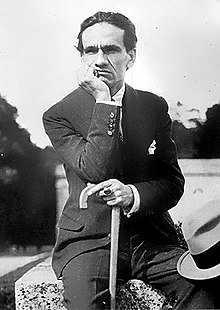César Vallejo
Appearance

César Abraham Vallejo Mendoza (March 16, 1892 – April 15, 1938) was a Peruvian poet. Although he published only three books of poetry during his lifetime, he is considered one of the great poetic innovators of the 20th century in any language.
Quotes
[edit]Aphorisms (2002)
[edit]- Los intelectuales son rebeldes, pero no revolucionarios.
- Intellectuals are rebels, not revolutionaries.
- p. 18
- Intellectuals are rebels, not revolutionaries.
- El puro y desadaptado que choca con el mundo de las farsas y de las apañucias.
- The pure and poorly adapted one who crashed against the world of fakes and cheats.
- p. 32
- The pure and poorly adapted one who crashed against the world of fakes and cheats.
- Aviation in air, in water and in spirit. Its laws are different in all three cases. The spirit soars the more it weighs and sinks into itself. The heavier the spirit, the higher and farther it flies.
- p. 51
- La mecánica es un medio o disciplina para pealizar la vida, pero no es la vida misma. Esa debe llevarnos a la vida misma, que está en el juego de sentimentos o sea en la sensibilidad.
- Mechanics is a means or discipline for the realization of life, but not life itself. It ought to carry us to life itself.
- p. 53
- Mechanics is a means or discipline for the realization of life, but not life itself. It ought to carry us to life itself.
- Las artes (pintura, poesía, etc.) no son solo éstas. Artes son también comer, beber, caminar: todo acto es un arte.
- The arts (painting, poetry, etc.) are not just these. Eating, drinking, walking are also arts; every act is an art.
- p. 60
- The arts (painting, poetry, etc.) are not just these. Eating, drinking, walking are also arts; every act is an art.
Quotes about César Vallejo
[edit]- I love César Vallejo. When I read his poems, I feel so sad. [laughter]
- Claribel Alegría Interview (2017)
- The poet that fully realizes the creative potential of conflict is César Vallejo. Poor, illegitimate, and shamed since childhood for his mestizo origin, he wrote from his experience as Garcilaso had done four hundred years before. But his orientation was radically different. Vallejo searched for unity, the connectedness of all peoples: "Oh exalted unity! Oh that which is one/for all!/Love against space and time!" and he found it in sound, in the intonation of his mother's voice. She held to the indigenous music while speaking Spanish. In "Trilce XXIII" the poet speaks of his mother, then he speaks to her. By the end we hear her voice as his when he says, "dí, mamá"...Poe, Mallarmé, and Baudelaire had already disrupted poetic diction by incorporating silence and the dark side of the soul. José María Eguren understood it as a philosophical and formal lesson. But Vallejo added two more elements: the Andean aesthetics of dissonance, which had been invisible in writing until then, and the ethical dimension of compassion. This was a monumental achievement. In a single poetic line, his verbs and nouns fight each other as people do in Andean ritual festivals, where dissonance operates through a clash perceived as unity (solidarity). In these festivals, dissonant sounds are experienced as "a single heartbeat"....Today, despite the onslaught of globalization, mestizo poetry continues to thrive. José Lezama Lima wrote that "a secret pulsation of the invisible moves towards the image, and the image desires to know and be known." The reciprocal exchange within the image is thus transformed into a new understanding of life force. A few decades before, Vallejo wrote that artists engender revolutions by creating "a cosmic hunger for human justice." The poet's work is to give shape to "the new chords that will produce those tones." Placing poetry in the vibratory field where perception participates in the co-creation of the world, Vallejo reclaims poetry's full potential, echoing the early vision of Huidobro: "Poetry is the life of life."
- Cecilia Vicuña The Oxford Book of Latin American Poetry (2009)

